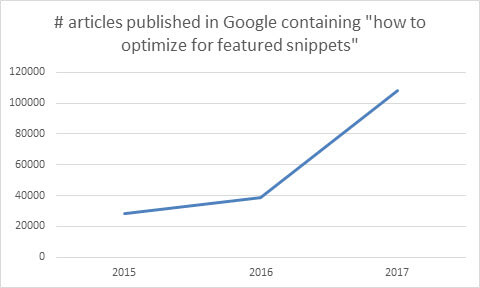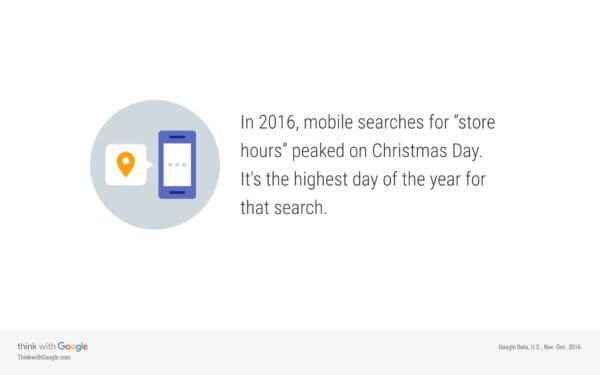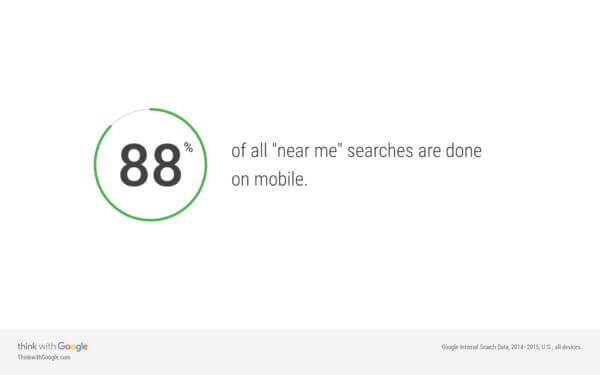SEO in 2018: Optimizing for voice search
Columnist Bryson Meunier argues that by understanding the nuances of voice search, marketers can do a better job of helping searchers find exactly what they're looking for when they're asking for it by voice.
Google Webmaster Trends Analyst John Mueller recently asked for feedback on why webmasters are looking for Google to separate voice search queries in Search Console. If you, like me, want to see voice searches in Google Search Console, definitely submit your feedback on Twitter as John requested.
I hear folks asking about voice search data in Search Console often. Can you elaborate on what you want to see there? What's an example of such a query that would be useful? pic.twitter.com/WOqS7aH4tP
— John 🧀 … 🧀 (@JohnMu) December 7, 2017
I lived through the very beginnings of mobile SEO, where many people thought mobile search behavior would be completely different from desktop search behavior only to find that much of it is the same. So I see why Mueller and others don’t necessarily understand why Search Console users would want to see voice queries separately. Some queries are the same whether they’re typed into a computer at a desktop or spoken across the room to a Google Home.
That being said, there are some very good reasons to want voice search data. Optimizing for voice search requires some slightly different tactics from those for traditional SEO, and having insight into these queries could help you provide a better experience for those searching by voice.
Not convinced you should care about voice search? Here are three reasons I think you should:
1. More visibility on featured snippets
One of the interesting things about Google Home is that when it answers a question with information from the web, it will cite the source of the information by saying the website’s name, and it will often send a link to the searcher’s Google Home app.
Currently, Google Home and Google Assistant read snippets from sites that are ranked in “position zero” and have been granted a featured snippet. This is why more people than ever are talking about how to optimize for featured snippets. If you look at the articles published on the topic (according to what Google has indexed), you’ll see that the number of articles about how to optimize for featured snippets has grown 178 percent in the past year:
Understanding voice search queries could help us better understand the types of queries that surface featured snippets. As marketers, we could then devote time and resources to providing the best answer for the most common featured snippets in hopes of getting promoted to position zero.
This helps marketers drive credibility to their brand when Google reads their best answer to the searcher, potentially driving traffic to the site from the Google Home app.
And this helps Google because they benefit when featured snippets provide good answers and the searcher is satisfied with the Google Home results. The better the service, the more consumers will use it — and potentially buy more Google Home units or Android phones because they think the service is worthwhile.
If bad featured snippets are found because no one is trying to optimize for those queries, or no featured snippets are found and the Google Home unit must apologize for not being able to help with that query yet, Google potentially loses market share to Amazon in the smart speaker race and Apple in the personal assistant race.
So this one is a win-win, Google. You need more great responses competing for position zero, and we want to help. But first, we need to know what types of queries commonly trigger featured snippets from voice search, and that’s why we need this data in Search Console today.
2. Better way to meet consumer demand and query intent based on context
We saw two major things happen in the early days of mobile SEO when we compared desktop and mobile queries:
- Searchers often used the same keywords in mobile search that they did in desktop search; however, certain keywords were used much more often on mobile search than desktop search (and vice versa).
- Whole new categories of queries emerged as searchers realized that GPS and other features of mobile search could allow them to use queries that just didn’t work in desktop search.
An example of the first point is a query like “store hours,” which peaks in volume when shoppers are headed to stores:
An example of the second is “near me” queries, which have grown dramatically with mobile search and mostly occur on mobile phones:
The mode of search therefore changes search behavior as searchers understand what types of searches work well on mobile but not on desktop.
Consider this in the context of voice search. There are certain types of queries that only work on Google Home and Google Assistant. “Tell me about my day” is one. We can guess some of the others, but if we had voice search data labeled, we wouldn’t have to.
How would this be useful to marketers and site owners? Well, it’s hard to say exactly without looking at the data, but consider the context in which someone might use voice search: driving to the mall to get a present for the holidays or asking Google Home if a store down the street is still open. Does the searcher still say, “Holiday Hut store hours?” Or do they say something like, “OK Google, give me the store hours for the Holiday hut at the local mall?” Or even, “How late is Holiday Hut open?”
Google should consider all these queries synonymous in this case, but in some cases, there could be significant differences between voice search behavior and typed search behavior that will affect how a site owner optimizes a page.
Google has told us that voice searches are different, in that they’re 30 times more likely to be action queries than typed searches. In many cases, these won’t be actionable to marketers — but in some cases, they will be. And in order to properly alter our content to connect with searchers, we’ll first need to understand the differences.
In my initial look at how my own family searched on Google Home, I found significant differences between what my family asked Home and what I ask my smartphone, so there’s reason to believe that there are new query categories in voice search that would be relevant to marketers. We know that there are queries — like “Hey Google, talk to Dustin from Stranger Things” and “Buy Lacroix Sparkling Water from Target” — that are going to give completely different results in voice search on Google Home and Assistant from the results in traditional search. And these queries, like “store hours” queries, are likely to be searched much more on voice search than in traditional search.
The problem is, how do we find that “near me” of voice search if we don’t have the data?
3. Understanding extent of advertising and optimization potential for new voice-based media
The last reason to pay attention to voice search queries is probably the most important — for both marketers and Google.
Let me illustrate it in very direct terms, as it’s not just an issue that I believe marketers have in general, but one that affects me personally as well.
Recently, one of my company’s competitors released survey information that suggested people really want to buy tickets through smart speakers.
As a marketer and SEO who sells tickets, I can take this information and invest in Actions on Google Development and marketing so that our customers can say, “OK Google, talk to Vivid Seats about buying Super Bowl tickets,” and get something from Google Home other than, “I’m sorry but I don’t know how to help with that yet.” (Disclosure: Vivid Seats is my employer.)
Or maybe I could convince my company to invest resources in custom content, as Disney and Netflix have done with Google. But am I really going to do it based on this one data point? Probably not.
As with mobile search in 2005, we don’t know how many people are using voice search in Google Home and Google Assistant yet, so we can’t yet know how big the opportunity is or how fast it’s growing. Voice search is in the “innovators and early adopters” stage of the technology adoption life cycle, and any optimizations done for it are not likely to reach a mainstream audience just yet. Since we don’t have data to the contrary from Google or Amazon, we’ll have to stay with this assumption and invest at a later date, when the impact of this technology on the market will likely mean a significant return on our investment.
If we had that data from Google, I would be able to use it to make a stronger case for early adoption and investment than just using survey data alone. For example, I would be able to say to the executives, “Look how many people are searching for branded queries in voice search and getting zero results! By investing resources in creating a prototype for Google Home and Assistant search, we can satisfy navigational queries that are currently going nowhere and recoup our investment.” Instead, because we don’t have that data from Google, the business case isn’t nearly as strong.
Google has yet to monetize voice search in any meaningful way, but when advertising appears on Google Home, this type of analysis will become even more essential.
Final thoughts
Yes, we can do optimization without knowing which queries are voice search queries, as we could do mobile optimization without knowing which queries are mobile queries; yet understanding the nuances of voice search will help Google and marketers do a better job of helping searchers find exactly what they’re looking for when they’re asking for it by voice.
If you agree, please submit your feedback to John Mueller on Twitter.
Contributing authors are invited to create content for Search Engine Land and are chosen for their expertise and contribution to the search community. Our contributors work under the oversight of the editorial staff and contributions are checked for quality and relevance to our readers. The opinions they express are their own.
Related stories



